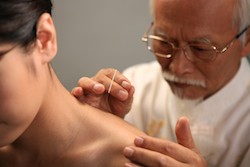New immunohistochemical electron microscopy reveals that acupuncture protects brain cells in cases of heroin addiction.  In controlled laboratory experiments of heroin addiction related brain damage, acupuncture restored nerve cells, endoplasmic reticulum and mitochondria in the brain’s hippocampus and frontal lobe. The research team noted that they produced evidence demonstrating that acupuncture can partially reverse the effects of heroin related brain injuries.
In controlled laboratory experiments of heroin addiction related brain damage, acupuncture restored nerve cells, endoplasmic reticulum and mitochondria in the brain’s hippocampus and frontal lobe. The research team noted that they produced evidence demonstrating that acupuncture can partially reverse the effects of heroin related brain injuries.
Re-addiction is the process in which addicts become addicted, withdraw and detoxify and then become addicted again in a repeated cycle. This may lead to extensive and sometimes irreversible damage to the brain by causing excessive apoptosis and nerve demyelination. The researchers studied the effects of needling acupuncture points GV20 (Baihui) and GV14 (Dazhui) based on prior research demonstrating that this point combination “reduces neuronal loss and attenuates ultrastructural damage in cerebral ischemic rats.”
The National Institute on Drug Abuse states that 4.2 million people in the USA have used heroin at least once. It is estimated that 23% of these individuals become addicted. The majority of heroin users are under the age of 26. Overdoses, unregulated purity and potency and chronic pathological damage are common consequences of illicit heroin use.
The researchers note that acupuncture produced several important beneficial effects. First, “the pathological damage in the hippocampus and frontal lobe was significantly reduced….” In addition, acupuncture significantly upregulated Bcl-2 and downregulated Bax expression. These two proteins are responsible for regulating cell preservation and cell death respectively.
Heroin addicts undergo a pathological decrease of Bcl-2 and increase of Bax. Acupuncture effectively regulated Bcl-2 and Bax in the study’s heroin re-addiction rats. The researchers noted, “Electron microscopy results showed that acupuncture can prevent brain cell apoptosis in heroin readdicted rats, which is most likely mediated by altering cell ultrastructure, regulating the expression of the apoptosis-related genes Bcl-2 and Bax, and changing Bcl-2/Bax ratio.” Also, the researchers discovered that “acupuncture has the potential to maintain mitochondria and rough endoplasmic reticulum function, promote the transport of proteins synthesized by membrane-bound ribosomes, and help to synthesize ATP, which are conducive to providing energy for a variety of physiological activities of cells and restoring the function of nerve nuclear groups in the hippocampus and prefrontal cortex.”
The goal of the study was to explore the neuroprotective effects of acupuncture on the brain. The researchers noted that “our study has provided a partial mechanism for the neuroprotective effect of acupuncture on brain cell death in heroin readdicted rats, and provided insights on the possibility of using acupuncture for the treatment of heroin readdiction.”
Heroin Withdrawal
Related research concludes that acupuncture is effective for the treatment of withdrawal symptoms and anxiety associated with heroin addiction. Researchers studied 60 males undergoing heroin withdrawal. A control group was compared with two acupuncture treatment groups. Group one received acupuncture at HT7 (Shenmen) and group two received acupuncture at PC6 (Neiguan). Both points demonstrated significant positive clinical benefits.
Cocaine Addiction
Another study of cocaine addicted lab rats discovered that acupuncture at point HT7 (Shenmen) had a “markedly reduced reinstatement of cocaine-seeking” with an 86.5 percent successful inhibition rate. The mechanism by which acupuncture prevents cocaine addiction relapse may be due to the ability of acupuncture to regulate “neuronal activation in the NAc shell.” The NAc (nucleus accumbens) is an area of the brain important in motor function, rewards and emotions. The researchers note that the NAc is “a brain structure implicated in stress-induced reinstatement of drug-seeking behavior.”
Acupuncture for the promotion of addiction recovery received public attention over a decade ago when Yale University researchers stated that auricular acupuncture is effective for the treatment of cocaine addiction. In the human controlled study, the acupuncture group tested 54.8 percent free of cocaine while the two control groups were 23.5 percent and 9.1 percent free of cocaine following treatment. Importantly, the acupuncture group demonstrated a lower recidivism rate.
References:
Hou, Xiaorong, Rongjun Zhang, Hang Lv, Xinghui Cai, Guangchuan Xie, and Xiaoge Song. "Acupuncture at Baihui and Dazhui reduces brain cell apoptosis in heroin readdicts." 中国神经再生研究 (英文版) 2 (2014).
Journal of Acupuncture and Tuina Science. Volume 10, Number 3 (2012), 155-159, DOI: 10.1007/s11726-012-0593-x. Therapeutic efficacy observation on acupuncture for post-withdrawal syndrome of heroin dependence. Yan Liang, Lei Zong, Yu Li, Bo Cheng, Jing Xu and Yue-lai Chen.
Psychopharmacology. 2012, DOI: 10.1007/s00213-012-2683-3. Effects of acupuncture on stress-induced relapse to cocaine-seeking in rats. Seong Shoon Yoon, Eun Jin Yang, Bong Hyo Lee, Eun Young Jang, Hee Young Kim, Sun-Mi Choi, Scott C. Steffensen and Chae Ha Yang.
Arch Intern Med. 2000;160(15):2305-2312. Randomized Controlled Trial of Auricular Acupuncture for Cocaine Dependence. S. Kelly Avants, PhD; Arthur Margolin, PhD; Theodore R. Holford, PhD; Thomas R. Kosten, MD. Yale University School of Medicine, New Haven, Connecticut.


